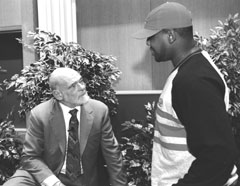The University Record, October 11, 1999 By Bernie DeGroat
News and Information Services

Sharing his philosophy of entrepreneurship, Chicago financier and alumnus Samuel Zell told the audience at the Business School’s 42nd annual Business Leadership Award lecture last week that being an entrepreneur can be lonely and often means “going right when everybody else is going left.”
Entrepreneurs, he said, reject conventional wisdom, are able to seize opportunities with a sense of urgency, take risks and “think outside the box.” And they never accept failure.
“An entrepreneur is somebody who doesn’t have the word ‘failure’ in his lexicon,” said Zell, chairman of Equity Investments Group, the largest real estate investment trust in America. “Sometimes deals don’t work out, but they never fail. Failure is accepting a resolution, when in fact a true entrepreneur uses his energy and self-confidence to live through difficult times. Failure is part of the process, but it isn’t a conviction. It only restarts the process.”
Zell and Ann Lurie, the widow of his late business partner Robert H. Lurie, recently gave the Business School $10 million to create an institute for research and teaching in entrepreneurship.
“Bob and I were always challenged by the idea that our society would benefit greatly by a greater emphasis on entrepreneurship, self-reliance, and understanding and undertaking risks,” he said. “And so in the creation of this institute, I hope that I can challenge the University to recognize that this is a whole arena where we don’t have answers, but have lots of questions. The challenge and the goals should be to answer those questions, recognizing that no answer, in and of itself, is a full answer.
“We want to create an environment where risk is not avoided, but where it’s evaluated. We want this institute to be a beacon, a magnet for the University, for the business community, for people with ideas.”

